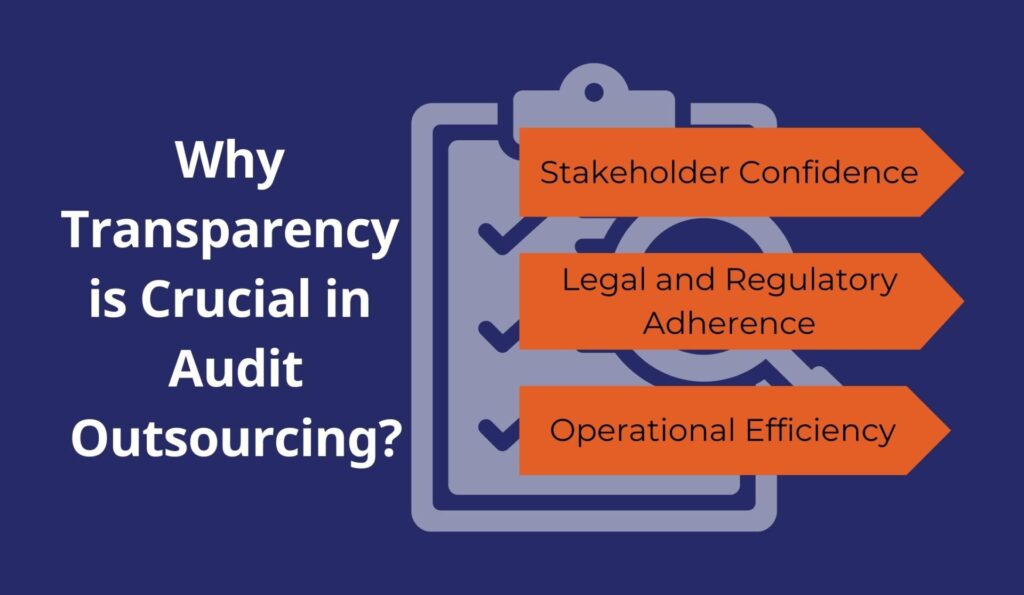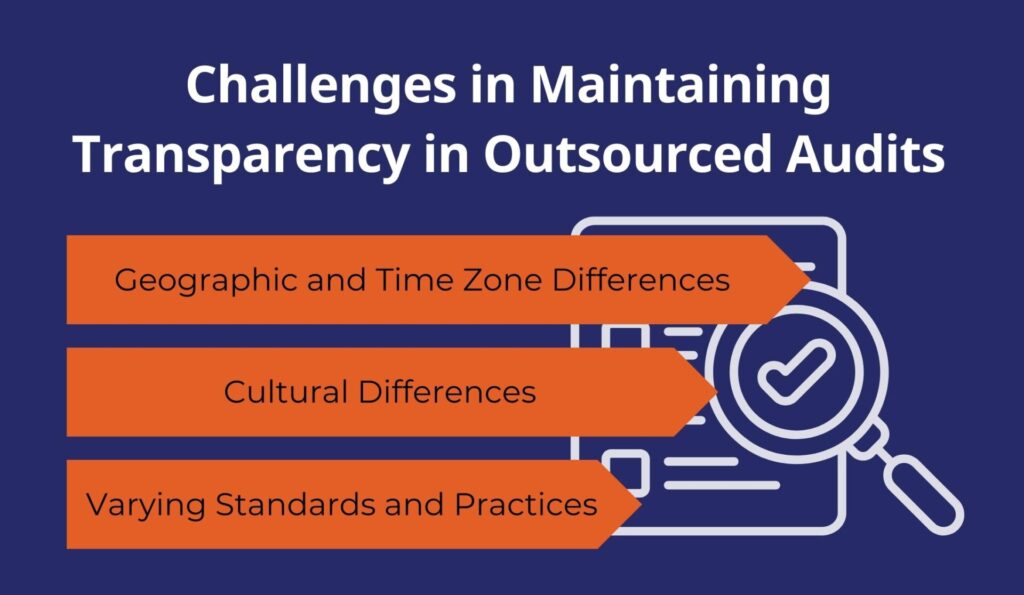Have you ever wondered why trust and transparency are like your secret allies in the world of auditing? Think of them as the guardians that make sure businesses, just like yours, always play fair and keep their financial numbers honest.
In this blog, we’ll dive deep into the crucial roles of trust and transparency in Audit Outsourcing, showing you how they serve as your reliable rulebook and impartial referee, maintaining a level playing field for your business. You’ll also understand why these elements become even more vital in the global landscape, where you collaborate with partners from around the world.
Why Transparency in Audit Outsourcing is Crucial
Transparency isn’t just a nice-to-have in audit outsourcing; it’s absolutely crucial for a few key reasons:

1. Stakeholder Confidence
Imagine you’re playing a game, and everyone is keeping their cards hidden. How would you know who’s winning or losing? In the business world, stakeholders like investors, regulators, and even the general public rely on audits to see how companies are doing financially.
- Transparent and accurate audits are like revealing those cards; they show the true picture of a company’s financial health. When stakeholders can trust that audits are honest and clear, they feel more confident in their decisions. It’s like knowing the rules of the game are fair, so you can make better choices.
- The impact of transparency in audit outsourcing goes beyond just trust. If audits aren’t transparent and accurate, it can shake up stock prices, investments, and even the overall confidence in the entire market. Think of it as a game where cheating can lead to chaos and losses for everyone.
2. Legal and Regulatory Adherence
Different countries have different laws and rules, just like different games have different sets of rules. When a company outsources audits to a firm in another country, it’s like playing a game with a whole new rulebook.
Transparency in Auditing is the key to making sure that everyone is following the right rules. If a company doesn’t play by the rules – in this case, the financial regulations – they can face serious penalties and legal action. It’s like getting a penalty in a game for breaking the rules.
3. Operational Efficiency
In a game, if everyone knows the rules and communicates well, the game runs smoothly and quickly. The same goes for audits. Clear communication between the company and the auditing firm makes the audit process faster and more efficient.
Transparency ensures that everyone understands what’s going on. It’s like everyone in the game understanding each other’s moves, which reduces errors and misunderstandings. When errors are reduced, it’s like playing a game with fewer mistakes – it’s more fun, and you get better results.
So, transparency in audit outsourcing is like playing a game where everyone’s cards are on the table, the rules are clear, and communication is smooth. It boosts confidence, keeps everyone on the right side of the law, and makes the whole process work like a well-oiled machine.
The Inherent Challenges in Maintaining Transparency in Audits Outsourcing
When it comes to outsourcing audits, there are some tough challenges to tackle. Imagine you’re working with people from all over the world – it’s like playing a game with teammates who speak different languages and live in different time zones. These challenges can make it hard to keep things transparent.
Let’s break it down:

1. Geographic and Time Zone Differences
Think about it as if your teammates live in different parts of the world. When it’s daytime for you, it might be nighttime for them. This can create problems because you’re not always awake and working at the same time.
So, if you have questions or need information, there could be a delay in getting answers. It’s like trying to have a conversation with someone who’s in a different time zone – you might have to wait a while for their reply.
2. Varying Standards and Practices
Different countries have different rules and ways of doing things. It’s like playing a game where everyone has their own set of rules. This can be confusing because what’s okay in one country might not be in another.
So, when you’re outsourcing audits to a company in a different place, you need to make sure they understand and follow the same rules and standards as you do. It’s like making sure everyone on your team is playing by the same rules, even if they learned different ones at home.
3. Cultural Differences
People from different countries might have different ways of looking at things. It’s like having friends from different cultures – they might have different customs and traditions. This can affect how they see transparency. For example, in some cultures, being direct and open is seen as a good thing, while in others, it might be considered rude.
So, when you’re working with a global team, you need to be aware of these cultural differences and find ways to communicate so that everyone understands. It’s like making sure everyone in your group feels comfortable and respected, even if they come from different backgrounds.
So, maintaining transparency when audit outsourcing can be a bit like playing a game with players from all over the world who have different schedules, rules, and ways of thinking. But with some understanding and clear communication, these challenges can be overcome, and everyone can play on the same team effectively.
Best Practices for Ensuring Transparency in Audit Outsourcing
Ensuring transparency in audit outsourcing isn’t just about good intentions; it requires specific practices to make it happen effectively:
1. Clear and Detailed Service Level Agreements (SLAs)
It’s like having a contract in a game that spells out exactly what each player should do. In audit outsourcing, SLAs are your rulebook.
Make sure these agreements define who does what, when, and how. Set clear goals and measurements for success, like milestones in a game. This way, everyone knows their roles and what’s expected.
2. Frequent Communication
Think of this as regular team meetings during a game. Set up check-ins and updates to keep everyone on the same page.
Use tools and platforms that allow real-time communication. It’s like talking to your teammates during the game – it helps everyone coordinate better.
3. Open Documentation Policies
Documentation is like keeping a record of all the moves in a game. Ensure that all the processes, data sources, and methods are well-documented.
Let your clients see what you’re doing by allowing them access to work papers and important documents. It’s like showing your fellow players your strategy in the game.
4. Third-Party Quality Assurance
Just as in a game, sometimes you need a referee to ensure fair play. Engage external reviewers to assess and validate the quality of your audit work.
If they spot any problems, address them openly and transparently. It’s like accepting the referee’s decision in a game.
5. Training and Integration Programs
When you bring in new players to a game, you teach them the rules and make them feel like part of the team. Similarly, train your outsourced teams about your company, industry standards, and local regulations.
Integrate them into your company culture and values. It’s like making sure everyone understands and follows the spirit of the game.
6. Technological Integration
In a game, you’d want everyone to see the same scoreboard. Employ unified platforms that let all stakeholders access important information.
Consider using advanced technologies like blockchain to ensure the integrity of data. It’s like having a super-secure game board that can’t be tampered with.
By following these best practices, you’re essentially creating a level playing field for audit outsourcing, where everyone knows the rules, communicates well, and plays fairly. This way, you can achieve the highest level of transparency and trust in the process.
Building a Culture of Trust in a Globalized Audit Landscape
Building trust in the global audit landscape is like nurturing a healthy garden. Here are some essential steps to make sure it thrives:
1. Recognizing Mutual Benefits of Transparency
Just like how plants and soil help each other in a garden, transparency in audit outsourcing is a win-win for both outsourcing providers and clients. When both sides can see what’s happening clearly, they can work together more effectively.
It’s crucial to understand that transparency isn’t just about one party benefiting; it’s about creating an environment where everyone thrives.
2. Encouraging Open Feedback Loops and Continuous Improvement
- Think of feedback like watering your plants. It helps them grow stronger. In the world of audits, feedback is vital.
- Encourage open channels for feedback. Clients should feel comfortable sharing their thoughts and concerns, and outsourcing providers should be eager to listen and improve.
- Just like a garden needs constant care, aim for a culture of continuous improvement. Learn from your experiences and keep making things better.
2. The Role of Leadership in Setting Transparency Standards:
- Leaders are like the gardeners who tend to the garden. They set the tone and standards for transparency.
- Leadership should champion the importance of transparency and lead by example. When leaders prioritize transparency, it becomes a core value in the organization.
- Like a garden with a dedicated gardener, a transparent culture needs leaders who are committed to its growth and health.
Conclusion
In the complex realm of global audit outsourcing, transparency is indispensable. Let’s underscore its pivotal role and envision its ongoing evolution. In today’s interconnected global business landscape, transparency in Audits is the foundation of trust. It upholds the integrity of audit outsourcing, ensuring financial accuracy and ethical standards. The path forward includes:
- Evolving Practices: Best practices will adapt to changing dynamics and emerging technologies.
- Regulations and Standards: Expect tighter regulations and global standards emphasizing disclosure and accountability.
- Technological Innovations: Embrace AI and blockchain for robust data integrity and transparency.
Actions to Take:
- Reflect on your transparency level and trust with stakeholders.
- Align with evolving standards and regulations.
- Foster open communication and feedback loops.
- Utilize AI, blockchain, and secure data-sharing platforms.
This structured approach highlights the paramount importance of transparency in audit outsourcing, providing actionable insights to strengthen trust in a global context. By following these steps, you ensure transparency stays central to your audit practices, building strong bonds of trust with stakeholders.
If you found this article insightful, don’t miss our other posts on Accounting, Auditing, and Outsourcing!
Want to optimize your business processes? Experience time savings, fewer mistakes, and professional support with AcoBloom’s Audit outsourcing offerings. Boost your business with our customized solutions and achieve precision and effectiveness in your financial planning. Reach out to us today for more details.
